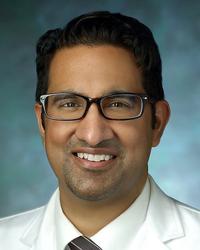Research Lab Results
-
Lilly Engineer Lab
Research in the Lilly Engineer Lab examines the quality and safety of medical care, with a focus on rural and underserved communities. Our current research evaluates methods for improving immunization rates among inner-city populations of school-aged children. We are also exploring the effect of federal policy changes and health care market forces on rural hospitals in the United States.
-
Neuro-Oncology Surgical Outcomes Laboratory
Directed by Debraj “Raj” Mukherjee, MD, MPH, the laboratory focuses on improving access to care, reducing disparities, maximizing surgical outcomes, and optimizing quality of life for patients with brain and skull base tumors.
The laboratory achieves these aims by creating and analyzing institutional and national databases, developing and validating novel patient-centered quality of life instruments, leveraging machine learning and artificial intelligence platforms to risk-stratify vulnerable patient populations, and designing novel surgical trials to push the boundaries of neurosurgical innovation.
Our research also investigates novel approaches to improve neurosurgical medical education including studying the utility of video-based surgical coaching and the design of new operative instrumentation.
-
Hadi Kharrazi Lab
Research in the Hadi Kharrazi Lab focuses primarily on contextualizing clinical decision support (CDS) into population health informatics (PHI) to be used at different HIT levels of managed care, including electronic health records (EHRs) and consumer health informatics (CHI) solutions. Our team has modified and regenerated electronic quality measures (eQM) based on PHI-derived CDS to represent a population aspect of the health quality measurements. Through the Center for Population Health IT (CPHIT) at the Bloomberg School of Public Health, we are pursuing PHI research that provides direct population-based CDS to providers, patients and payers. -
Michael A. Rosen Lab
Research in the Michael A. Rosen Lab primarily focuses on patient safety and simulation-based health care training and technology. Recent work provided examples of how human factors experts can collaborate with health care professionals and simulationists (experts in the design and implementation of simulation) to use contemporary simulation to improve health care delivery. Another recent study examined the anesthesia practice at two tertiary care hospitals in Sierra Leone, West Africa, where anesthesia is associated with high mortality rates. We identified gaps in the application of internationally recommended anesthesia practices at both hospitals, likely caused by lack of available resources.
-
Samantha Pitts Lab
Research in the Samantha Pitts Lab focuses on care safety and quality in ambulatory patients. Specifically, our activities have included applying the Comprehensive Unit-based Safety Program (CUSP) in office-based practices and improving the delivery of evidence-based care through clinical care teams.
-
Sara Mixter Lab
Research in the Sara Mixter Lab focuses on primary care medical education, particularly quality improvement, high-value care and care transitions for adolescents with developmental disabilities and other special health care needs.
-
Sean Berenholtz Lab
Work in the Sean Berenholtz Lab focuses on patient safety, ICU care, quality health care and evidence-based medicine. Two notable and successful projects include the National On The Cusp: Stop BSI project, which was implemented in 47 states with the goal of eliminating bloodstream infections, and the Agency for Healthcare Research and Quality (AHRQ)-funded Keystone ICU project, which improved communication and teamwork and reduced hospital-acquired infections in more than 100 ICUs in Michigan. One recent study focused on ventilator-associated pneumonia (VAP), one of the most common type of health care-associated infections in the ICU. Existing VAP prevention intervention bundles vary widely on the interventions, but our research team described a structured approach for developing a new VAP prevention bundle. -
Charles Hugh Brown Lab
The Charles Hugh Brown Lab researches cognitive dysfunction, with a focus on quality of care and outcomes regarding perioperative management of older patients. Our studies explore post-operative delirium, cognitive changes and transfusion practices. We also have a longstanding interest in cerebral autoregulation and its role in post-surgical outcomes.
-
Aliaksei Pustavoitau Lab
The Aliaksei Pustavoitau Lab conducts research on models and mechanisms of impaired consciousness in patients who have suffered acute brain injury. Examples of our work include a study on the mechanisms of neurologic failure in critical illness and another on the use of intensivist-driven ultrasound at the PICU bedside. We also have a longstanding interest in patient safety and quality of care in the ICU setting.
-
Cynthia Boyd Lab
Research in the Cynthia Boyd Lab concentrates on the clinical care of comorbid chronically ill and frail older adults, both chronically and during acute illnesses. Current projects focus on the treatment burden among older adults with multimorbidity, the importance of competing risks in decision-making for the elderly, the effects of guided care on the quality of care and the improvement of clinical practice guidelines for the elderly.

